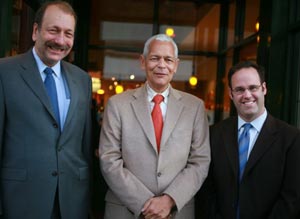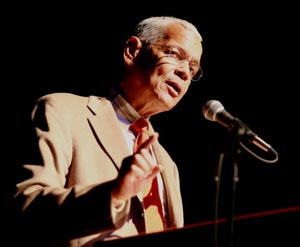NAACP chairman Julian Bond criticized the nation's electoral process and the Bush administration in his address at the 24th annual Martin Luther King Jr. Memorial Convocation January 30.
Bond, 68, also touched on his time as a student of King's at Morehouse College in Atlanta, Ga., the turbulent civil rights era that led to the passage of the 1964 Civil Rights Act, erosion of affirmative action policies, the current presidential nomination race, and more during his 45-minute talk before 1,100 people at the Civic Auditorium in Santa Cruz.
He had the audience laughing when he started off by mischievously claiming to have been the source of perhaps King's most famous quote.
He recalled how he and King were walking together at Morehouse College when he asked King how he was doing. King listed several civil rights issues that deeply concerned him and said, "I have a nightmare."
Bond admonished him to look at it more positively.
"No, don't you mean, 'I have a dream'?" said Bond, a smile twisting his lips. As the audience laughed, he said, "I'm sensing doubt."
The grandson of a man born into slavery, Bond helped found the Atlanta student sit-in and anti-segregation organization and the Student Nonviolent Coordinating Committee (SNCC) in 1960 while a student at Morehouse. As SNCC's communications director, he was active in protests and voter registration campaigns throughout the South.
Elected in 1965 to the Georgia House of Representatives, Bond was prevented from taking his seat by members who objected to his opposition to the Vietnam War. He was re-elected to his own vacant seat and un-seated again, and was finally seated only after a third election and a unanimous decision of the United States Supreme Court.
He is a distinguished professor at American University in Washington, D.C., and a professor in history at the University of Virginia. He has served since 1998 as chairman of the National Association for the Advancement of Colored People (NAACP), the oldest and largest civil rights organization in the United States, and he continues to write and lecture about the history of the civil rights movement and the condition of African Americans and the poor.
In 2002, he received the National Freedom Award.
UC Santa Cruz officials expressed their pleasure at Bond's presence at the event in their opening remarks.
"I'm delighted a person of the national eminence of Julian Bond has agreed to be our speaker this evening," said Chancellor George Blumenthal.
"History is race," said Bond after the crowd's laughter subsided following his opening story, reciting a litany of charged words: slaveholders, Civil War, Jim Crow, Ku Klux Klan, and Jena.
And yet, he said, the spirit of Martin Luther King, Jr. is especially evident this year, with a black man, a woman, and only one white male running for the presidential nomination of the Democratic party.
But the election system in this country is broken, said Bond, tall, with white hair, a distinguished bearing, and a deep orator's voice. He denounced the weight and importance given to the Iowa caucuses and New Hampshire primary, saying those states are mostly white and don't represent an accurate picture of the nation.
"Front-loading is good for washing machines," said Bond, "but terrible for elections."
Bond has been a critic of the Bush administration since it began, and he had strong words for the president again Wednesday night, saying, "we're going to speak truth to power until they leave town."
"President Bush said he wanted to be a uniter. It took him seven years, but boy, has he succeeded," said Bond. "He has united Americans around a desire for change. He has united Americans in our anxiety about our economic well-being and whether, perchance, the American dream is over; about an unpopular war of choice; and about America's reduced standing in the world."
Bond called the Iraq War "such an abomination it's almost beyond mention" and cited statistics illustrating the disparity in economic well-being between blacks and whites.
Affirmative action is under attack not because it failed but because it succeeded, he said, and it must be restored.
"We have a long and honorable tradition of social justice in this country," said Bond. "If we act together, we can overcome."
Also at the event, organizers paid tribute to the memory of the late Tony Hill, the prominent local community activist and longtime member of the convocation planning committee who died in August at 62.
Hill's friend, George Ow Jr., and his widow, Melanie Stern-Hill, announced the establishment of the annual Tony Hill Award, to be given at each Martin Luther King Jr. Memorial Convocation to a person who exemplifies Hill's life and work in the community.




